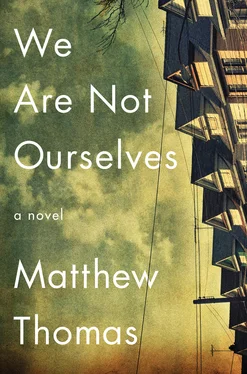She couldn’t look across at the Palumbos’ just then, with their dreadful chandelier glowing like margarine and the two of them looking all their years as they sat down to a cheerless meal, so she got up to close the drapes. Ed took her rising as a cue that the meal was over and headed for the couch.
• • •
When she and Ed moved in, the neighborhood was Irish, Italian, Greek, and Jewish, and they knew everyone on the block. Then families started to trickle out, and in their place came Colombians, Bolivians, Nicaraguans, Filipinos, Koreans, Chinese, Indians, Pakistanis. Connell played with the new kids, but she never met the parents. When an Iranian family — they called themselves Persian, but she couldn’t bring herself to refer to them as anything but Iranian — bought her friend Irene’s place up the block after she moved to Garden City, the son, Farshid, became a classmate of Connell’s at St. Joan of Arc and started hanging around the house.
It wasn’t hard to feel the pull of the suburbs, because the neighborhood was half suburb already, arranged around mass transit but also around car travel. There were driveways next to every house, and gas stations and car dealerships at regular intervals along Northern Boulevard. LaGuardia Airport was a short drive away, and Robert Moses’s highways, and the massive parking lots at Shea, and the husk of the World’s Fair, which had left detritus like a glacier.
Most of the stores she loved were gone, replaced by trinket shops, T-shirt shops, fireworks black marketeers, exotic hair salons hidden behind heavy curtains, over-the-counter purveyors of deadly martial arts paraphernalia, comic book stores, karate schools, check-cashing places, Korean-run Optimo-branded cigar and candy stores that sold cheap knockoffs of popular Japanese toys, taxi depots, sketchy bars, fast food, wholesalers of obscure cuisines, restaurants suggestive of opium dens, bodegas stocked with products she would never consider eating. The Boulevard Theatre on the corner was now a Latin dance hall with neon lights flickering late into the night and an insistent beat that hectored the remaining old guard to leave. Cars piled up outside it and the cops were always breaking up fights. The gloomy little Irish bar was the last stand against the invasion, but she couldn’t take some specious pride in it now after avoiding it all these years.
The memory of wealth haunted the nearby garden apartment buildings. She imagined gaunt bachelors presiding over dwindling fortunes, long lines coming to a silent end. There were remnants of the way it had been, like Barricini’s Chocolates and Jahn’s, but stepping into them only reminded her how few of the old places were left.
She knew it was possible to see the changes as part of what made the city great, an image of what was to come, the necessary cycle of immigration, but only if you weren’t the one being displaced. Maybe even then you could, if you were a saint. She had no desire to be a saint, not if it meant she’d have to blunt the edge of her anger at these people. It certainly wasn’t saintliness that led her to attempt to get past her resentment at the break-in that occurred a couple of years back, while they were on a cruise in the Bahamas. Rather, it was a desire to continue living in the neighborhood without boiling over into outright vitriol whenever she stepped into the grocery store, where anyone she laid eyes on, worker or customer, unless they looked respectable, could have been one of the offenders. She had returned from that cruise to find her jewelry box rifled through and her drawers turned inside out. Luckily, she’d long ago overridden Ed and spent the money to rent a safe deposit box at Manufacturers Hanover, where she stored Ed’s LeCoultre watch and her mother’s embattled engagement ring. All the bonds were in the box as well. She took a certain satisfaction in thinking of how little the thieves had made off with; for once it seemed an advantage that Ed had never been the sort to buy necklaces and bracelets for her birthday or their anniversary. The degenerates had pinched Ed’s stereo, that was true, but he’d needed a new one for years, and this was an excuse for her to buy one for him. She was angry too at the Orlandos, who’d been home at the time. She couldn’t imagine how they hadn’t heard anything, or done anything if they’d heard. What kept her awake some nights, though, fantasizing about revenge, was the fact that they’d taken Mr. Kehoe’s clarinet from the bedroom closet. What could they possibly have wanted with a clarinet? How valuable could such a thing have been on the secondhand market? There was no way they were keeping it for themselves, because the swine wouldn’t know what to do with such a delicate instrument. She pictured them back in their sty of an apartment, surveying their loot, sniffing it, looking at the clarinet’s pieces in stupefaction and dropping them into a garbage can.
She couldn’t blame everything on the latest waves of immigration. Her immediate neighbors had been there longer than she had and both had fallen on tough times. Both houses used to look respectable, if a little dull, with dingy lace curtains in the windows and bleached paint on the trim, but now a rusted-out car sat on blocks in the Palumbos’ backyard, next to a rain-filled drum, and Gene Cooney’s house was under permanent construction, with ugly scaffolding marring the facade and a garden box full of crabgrass and construction debris. Gene stalked the perimeter all day with an edgy intensity, wearing a tool belt around his waist. Wild rumors had sprung up about him and his family, spread by newer residents. He was said to be an IRA arms smuggler lying low. There were whispers about his daughter, who wore short skirts and fishnet stockings and kept nocturnal hours. Eileen knew the truth: he’d gone off the rails after his wife had been killed on Northern Boulevard by a hit-and-run driver, and his daughter wasn’t a prostitute but a girl who had fallen victim to the fashions of the Hispanics she’d grown up around — though one could be forgiven for confusing some of them with hookers.
When she’d first moved onto the block, the garden boxes in front of the houses were lush with flowers in bloom and respectable attempts at horticulture, but many had since returned to the wild, with giant weeds poking up over their walls. She was committed to making hers an oasis against decay, although she hadn’t inherited her father’s sympathy with all manner of vegetable life. Angelo had helped her keep things alive, and she’d picked up a bit of knowledge working alongside him, but ever since his third heart attack had killed him a few years back, she was constantly buying new plants to replace the ones that wilted in the middle of the night.
She overspent on furniture. She had the rugs cleaned and the walls painted every two years. She’d found a beautiful crystal chandelier on sale on the Bowery. The house wasn’t fancy, but it had a certain luster. The one thing she couldn’t escape was the sound of the Orlandos’ footsteps above her. The fact that she owned the whole building didn’t make it any more pleasant to hear them.
• • •
Ed was seated at the table as she fixed the tea. His back was to her, possessed of that solidity that so delighted her the first time she put her arms around him. Now she wanted to pound on it. He was hunched over and rubbing his temples. She put a hand on his shoulder and he flinched at her touch. She thought, Who the hell does he think I am?
• • •
She considered flinging herself on him before he could get the headphones plugged in. She thought of ripping the plug out once he’d settled into his pillow and filling the room with sound, screaming over the music the invectives she’d held in. But she didn’t do that. She sat in the armchair and read a book until she headed to bed.
Читать дальше
Конец ознакомительного отрывка
Купить книгу












